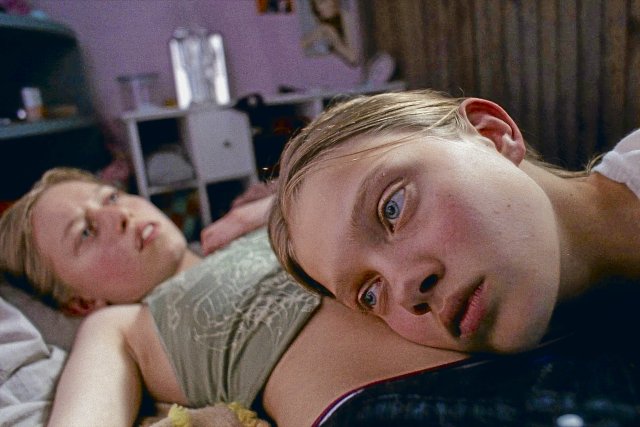After all, they still have the energy to believe in a promise of happiness.
Foto: Copyright Akis bado/Grandfilm
Films from the Baltic States, in this case from Lithuania, you rarely meet in the local cinema. It is all the more interesting the insight into the social constitution of the country, which we owe to the author Saulė Bliuvaitė born in 1994, who processed her own experiences as a teenager in a toxic environment in »Toxic«. The development of the three Baltic countries after (re) acquisition of independence is generally considered a neoliberal success story, and in 2004 they joined the EU. In Lithuania, however, this supposed success with the emigration of almost a quarter of the population has been expensive since 1991.
The world in which 13-year-old Marija lives makes the desire for emigration immediately understandable. Boredom, poverty and lack of prospects in the bleak and dilapidated industrial city shape the life of adolescents. Marija (Vesta Matulytė) has been left by her mother and has to move to her grandmother. It is lonely in the new city, and because it is big and pretty, but has a slight walking disability, it is bullied by the others. Now, of course, society would not be the one in which we live if the dreams and longings of the suspended small town youth could not be exploited and turned into sounding coin. For Marija and her first rival, then close girlfriend Kristina (Ieva Rupikaitė), the local fashion agency is the promise of happiness that the half-female girls plant the dream of the large (model) world in order to properly collect using overpriced photo shoots and catwalk climb.
In view of the promise of a better life, the girls willingly fit the constraints that the hoped -for model career imposes them. To counter the prescribed ideal dimensions is not the only violence that they do to their bodies, including eating disorders and self -hatred. It is depressing to look at how the girls are looking for identity and belonging themselves to meet themselves in order to meet a system that wants nothing more than exploiting them and paying it in.
In view of the promise of a better life, the girls willingly fit the constraints that the hoped -for model career imposes them.
The next stage in the inhumane recycling chain of the model (un) nature, in which women are nothing more than material and/or fresh meat for solvent men, both will not climb, so much can be revealed. However, the overall picture of lost in a lost world, which the director designs, is more interesting than the too short dream of the two of the model. “Toxic” is the portrait of a youth that is stunned by the artifacts of a lost working society and is largely on its own.
The camera (Vytauta’s Katkus) finds an enchanting picture for the emotional situation of their protagonists and the desolation of the post -industrial landscapes in which the young people create their own rooms. Here, where they are entirely among themselves, the values and structures of adults lose their importance, the sky is wide and the excess is close. One is reminded of the pictures of photographer Tobias Zielony, who became known with his unadorned portraits of young people in public spaces. Zielony serves as the scene of the urban edge zones, which are captured by the young people and which, after dark, radiate a latent threat. Director Saulė Bliuvaitt pursues the same principle and observes the young people in calm, well -composed attitudes at their Clandestines. The adults practically do not occur; You are busy with yourself and your own struggle for survival. There is also nothing to see from the state and its institutions and nothing to be expected, the school hardly plays a role in the life of the girls.
With “Toxic” Saulė Bliuvaitė won the “Golden Leopard”, the main prize of the Locarno film festival, immediately in her first competitive invitation. The jury may have convinced the universality of the history of a exploitative, patriarchal society, with whose toxic structures many young women around the world are struggling.
»Toxic«: Litauen 2024, Regie: Saulė Bliuvaitė. MIT: Ieva Rupeikaitė, Vesta Matulytė, Giedrius Savickas. 99 minutes, Start: 24. April.
